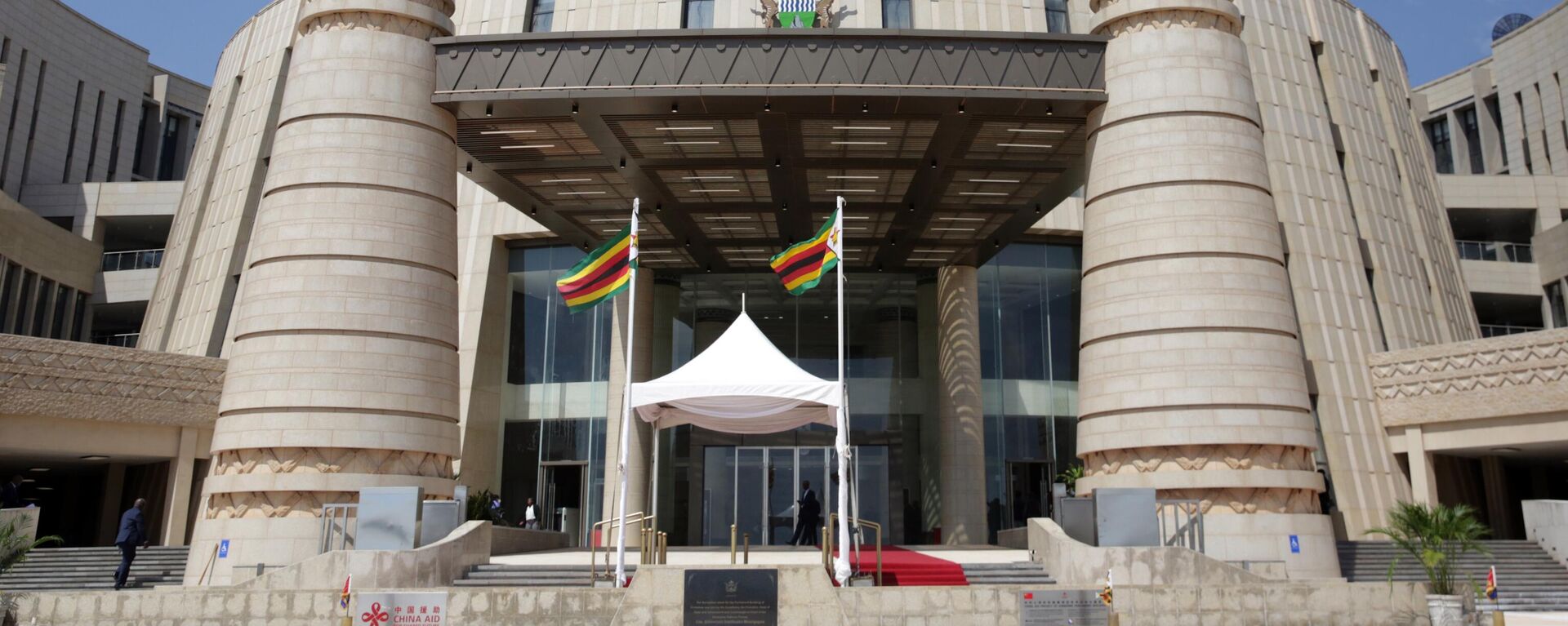https://en.sputniknews.africa/20230516/zimbabwe-sanctions-contribute-to-unsustainable-debt-increase-afdb-president-says-1059293924.html
Zimbabwe Sanctions Contribute to Unsustainable Debt Increase, AfDB President Says
Zimbabwe Sanctions Contribute to Unsustainable Debt Increase, AfDB President Says
Sputnik Africa
Economic sanctions imposed on Zimbabwe substantially limit its access to credit and thus drive the nation "further into unsustainable debt," said the African Development Bank (AfDB) President Akinwumi Adesina.
2023-05-16T17:20+0200
2023-05-16T17:20+0200
2023-05-16T17:20+0200
sub-saharan africa
southern africa
zimbabwe
debt
debt restructuring
debt relief
us sanctions
sanctions
crisis
african development bank (afdb)
https://cdn1.img.sputniknews.africa/img/07e7/01/1c/1057732707_0:0:3000:1688_1920x0_80_0_0_75e7cc288abdb35689c1ce9750845af8.jpg
Economic sanctions imposed on Zimbabwe substantially limit its access to credit and thus drive the nation "further into unsustainable debt," said African Development Bank (AfDB) President Akinwumi Adesina. Delivering his remarks at Zimbabwe’s High-Level Debt Resolution Forum held on May 15 in the capital city of Harare, Adesina highlighted the detrimental impact of the sanctions on the country's economy. Noting that the "arrears is now the new debt of Zimbabwe," the AfDB president stated that out of the $5.7 billion of the country's bilateral debt, 69% account for arrears, while of the $2.6 billion of multilateral debt, arrears represent 91%. According to Adesina, the nation is unable to "run up the hill of economic recovery carrying a backpack of debt." Therefore, he underscored, it's time for all parties concerned to step up efforts aimed at reducing Zimbabwe's heavy debt burden. The bank head is co-chairing a process that is intended to clear $6 billion of Zimbabwe's external debt arrears, as well as implement reforms to the exchange rate and central bank. The AfDB president noted that the success of the efforts to restructure the country's debt depend not only on economic factors but also on political issues, such as the introduction "of electoral reforms that will assure free and fair elections." Apart from that, he highlighted the importance of the issue of compensating white farmers. In July 2020, the country's government signed a $3.5 billion compensation deal with white farmers whose land was expropriated during a land redistribution program that took place in the early 2000s under former President Robert Mugabe. Since then, Zimbabwe has repeatedly missed payment deadlines stipulated by the initial agreement.According to Adesina, the AfDB is cooperating with Zimbabwe's government to establish financial instruments and structures in order to "front-load the mobilization of the $3.5 billion for compensations." He emphasized that these instruments will allow "to leverage capital markets to fund the compensations without additional debt for Zimbabwe."Alongside limited access to credit, the country is experiencing other economic hardships, including hyperinflation, high unemployment, agricultural decline, as well as shortages of basic goods. The difficulties are largely attributed to sanctions imposed against the nation at the beginning of the 21st century.
https://en.sputniknews.africa/20230512/zimbabwe-moves-to-stabilize-local-currency-under-enormous-pressure-1059197229.html
southern africa
zimbabwe
Sputnik Africa
feedback@sputniknews.com
+74956456601
MIA „Rossiya Segodnya“
2023
News
en_EN
Sputnik Africa
feedback@sputniknews.com
+74956456601
MIA „Rossiya Segodnya“
Sputnik Africa
feedback@sputniknews.com
+74956456601
MIA „Rossiya Segodnya“
african development bank (afdb), akinwumi adesina, zimbabwe, debt, debt relief, debt burden, debt restructuring
african development bank (afdb), akinwumi adesina, zimbabwe, debt, debt relief, debt burden, debt restructuring
Zimbabwe Sanctions Contribute to Unsustainable Debt Increase, AfDB President Says
According to World Bank 2022 estimates, Zimbabwe had about $14 billion in external debt. Since the 2000s, the southern African country has not been able to secure new financing from multilateral lenders as it was subjected to economic sanctions by the US and its allies over alleged human rights abuses.
Economic sanctions imposed on Zimbabwe substantially limit its access to credit and thus drive the nation "further into unsustainable debt," said African Development Bank (AfDB) President Akinwumi Adesina.
Delivering his remarks at Zimbabwe’s High-Level Debt Resolution Forum held on May 15 in the capital city of Harare, Adesina highlighted the detrimental impact of the sanctions on the country's economy.
"The debt itself is not as debilitating as the arrears on the debt since the country cannot access international concessional financing or other revenue or less expensive financing to pay down its debt obligations," Adesina explained.
Noting that the "arrears is now the new debt of Zimbabwe," the AfDB president stated that out of the $5.7 billion of the country's bilateral debt, 69% account for arrears, while of the $2.6 billion of multilateral debt, arrears represent 91%.
"I am very concerned about debt, and even more concerned about debt accumulation from arrears that don’t have an end in sight," he noted.
According to Adesina, the nation is unable to "run up the hill of economic recovery carrying a backpack of debt." Therefore, he underscored, it's time for all parties concerned to step up efforts aimed at reducing Zimbabwe's heavy debt burden.
The bank head is co-chairing a process that is intended to clear $6 billion of Zimbabwe's external debt arrears, as well as implement reforms to the exchange rate and central bank.
The AfDB president noted that the success of the efforts to restructure the country's debt depend not only on economic factors but also on political issues, such as the introduction "of electoral reforms that will assure free and fair elections." Apart from that, he highlighted the importance of the issue of compensating white farmers.
"It is important that we find a mechanism to try to fast-track and front-load the payment of these compensations [...] Further delays in paying the compensations could erode trust and confidence," Adesina stated.
In July 2020, the country's government signed a $3.5 billion compensation deal with white farmers whose land was expropriated during a land redistribution program that took place in the early 2000s under former President Robert Mugabe. Since then, Zimbabwe has repeatedly missed payment deadlines stipulated by the initial agreement.
According to Adesina, the AfDB is cooperating with Zimbabwe's government to establish
financial instruments and structures in order to "front-load the mobilization of the $3.5 billion for compensations." He emphasized that these instruments will allow "to leverage capital markets to fund the compensations without additional debt for Zimbabwe."
Alongside limited access to credit, the country is experiencing other
economic hardships, including hyperinflation, high unemployment, agricultural decline, as well as shortages of basic
goods. The difficulties are largely attributed to sanctions imposed against the nation at the beginning of the 21st century.


